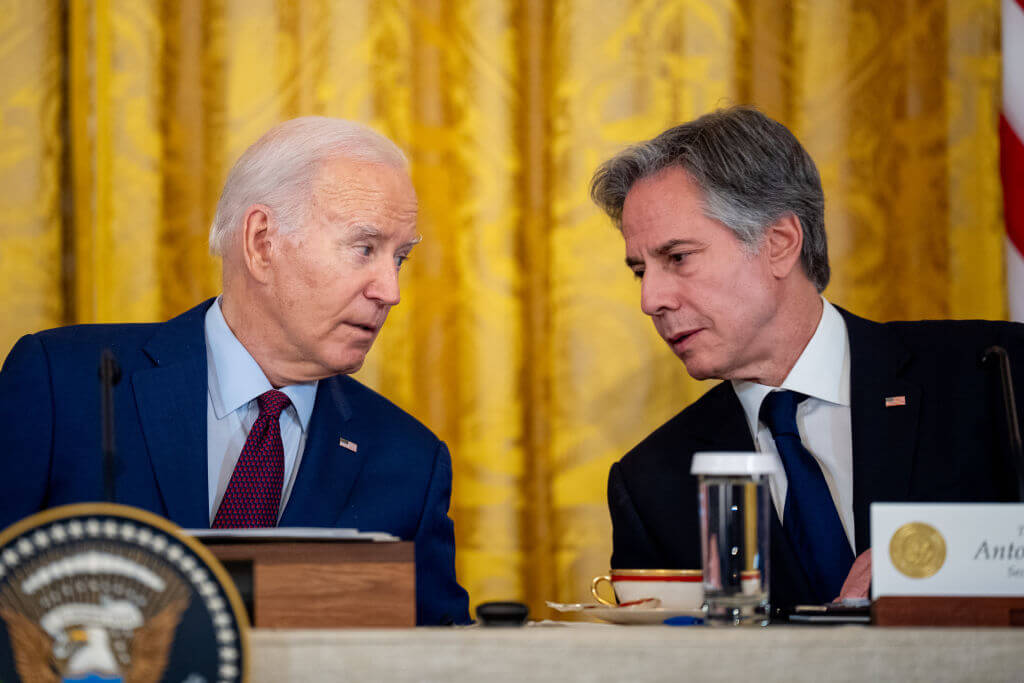Iraq War Pushes Little-Known Assyrians to Fore
CHICAGO — Waving American flags, more than 400 people gathered last Sunday in Chicago’s Warren Park, carrying signs that read “God Bless America.” At first glance, the scene was unremarkable in this time of rallies for and against the war. But there was something unusual about this crowd. Their Middle Eastern looks. The hand-lettered signs that read, “Thank you for freeing my homeland.”
Most striking to a Jewish observer were the oddly familiar yet mysterious syllables resounding occasionally from the platform. “Shlam Alukhem,” one speaker said, “Talbakh min maren esho meshikha qat khame l’da atra…” It didn’t quite sound like Arabic. It certainly wasn’t Hebrew. To the scholarly ear it sounded curiously like the language of the Talmud, Aramaic.
It was. Asked what language they were speaking, attendees at the rally said it was “Assyrian” and that they were members of the Assyrian people. Rare media accounts of this group tend to group them with other, larger Iraqi minorities, such as the Kurds or the Shiites. Like these groups, Assyrians have suffered atrocities at the hands of Saddam Hussein. But the Assyrians are unique, Joseph Tamraz, Midwest director of the Assyrian American National Federation, told the Forward. “We are the oldest indigenous people of Iraq. We are different in our ethnicity and in our Christianity.”
Assyrians have been culturally distinct from their Arabic-speaking neighbors since Arab peoples invaded Mesopotamia in the year 637 of the current era. Due to ongoing persecution, most Assyrians now reside abroad; estimates of their worldwide numbers vary from less than 1 million to 3 or 4 million. The Assyrian language, known to linguists as neo-Aramaic, is a modern evolution of the ancient language familiar to Jews from the Kaddish prayer, the Passover song “Chad Gadya” and the Talmud.
Last Sunday’s rally was organized by the umbrella organization for Assyrian associations in Chicago. It was conducted in both Assyrian and English and consisted of prayers, songs, praise for the American troops and expressions of concern for the future of the Assyrian homeland, which they call Bet Nahrain, or “between two rivers.”
Benjamin Lincoln Tamraz, an American veteran, told the crowd that a group of Iraqi-born Chicago Assyrians had volunteered for the war.
Joseph Gemayez, a specialist in the U.S. Army, addressed the rally, saying: “Iraq will be liberated. I’m going back to Assyria, the land between the rivers. Keep all of our troops in your prayers because they are doing it for the right reasons. This is not a war for oil. This is not a war for any of the wrong reasons. There are women who have been gang-raped. There are people whose rights have been violated.”
Gemayez also expressed nationalist aspirations. “It’s time for the Assyrian nation to come back to its land and form a nation of its own called Assyria,” he said to loud cheers and applause. “We should all together write letters to Washington, D.C., stating that, when we liberate Iraq, the Assyrians should at least get a piece of land over there that we can call our own.”
Not everyone there was calling for immediate statehood. “For now we would like to have our rights — we would love to see Assyrians being recognized in Iraq, that’s our hope right now,” said Benjamin Samir, a currency exchange clerk.
The speeches were frequently punctuated by outbursts from the crowd. “We lost our country because we are Christian!” one man shouted. Others chanted, “Down with Saddam!”
One demonstrator, who identified himself only as Jendo, a doctor, said Assyrians had been massacred by Muslims throughout the 20th century, most recently by Saddam. “I have the names of 180 villages that were destroyed in the 1980s — all the churches, all the houses. People were moved and some people are missing until now.”
Some demonstrators refused to speak on the record for fear of retribution against their families in Iraq. Asked whether they thought Saddam reads the Forward, one man replied, seemingly seriously, that the Iraqi dictator “reads everything.”
Several demonstrators told the Forward that Israel and Jews should support the Assyrian cause. “If the Israeli people support our people to get back our country, then the Israeli people will be tougher in the Middle East. They will have more freedom,” said George Atto, a taxi driver.
“Who’s related to the Israelis in the Middle East more than us?” Atto said. “We have a prayer in church, “Allah barech la bnei yisrael” — “God bless the people of Israel.”
When asked about the policies of Prime Minister Sharon, George Khoshaba, a factory worker, said: “I support him 100%. He is doing the right thing. To protect his own people, his country.”
Such views are common in the Assyrian community, said Peter Dagher, a former White House aide and Assyrian activist. “Many Assyrians are not pro-Arab,” he said. “Their views and those of Arabs are not the same. In that part of the world they look at Israel as an example of what to do, rather than what not to do.”
Jewish and Assyrian paths have crossed before. In 1943 the American Zionist leader Hayim Greenberg was approached by an Assyrian activist seeking help in their quest for independence. Greenberg later wrote of his misgivings, wryly recalling that the Assyrians’ ancient forebears shared some blame for the Jews’ modern plight.
More recently, the California-based Assyrian National Congress appeared jointly with Hadassah before a United Nations committee in January 2000 to apply for recognition as nongovernmental organizations. Hadassah was accepted, but the Assyrian group could not overcome Arab hostility.
Still, there are profound cultural similarities between Assyrians and Jews. Assyrians this week celebrated their New Year, Kha B’Nissan, the first day of the month of Nissan, a date described in the Mishna as one of four New Years of Judaism. And while neo-Aramaic is much changed from its ancient counterpart, many words remain the same.
The cultural affinities arise from the fact that Aramaic was the lingua franca of the ancient Near East prior to the Arab conquest, said Samuel Fox, a linguist and author of “The Neo-Aramaic Dialect of Jilu.” Over the centuries the Arabic language and Muslim religion became dominant in what is now Iraq. “The Assyrians were people who retained their Christian identity and traditional language, mainly in the mountainous region near the Iran-Iraq-Turkish border, in Iranian Azerbaijan, and in the plain of Mosul,” Fox said.
While many Assyrians continue to dream about self-determination, Dagher said, their main concern is ensuring the safety of their brethren in a post-Saddam Iraq. “If I thought it wouldn’t hurt our cause, I would be pushing for an Assyrian state, but I think we’re not organized enough, we’re not there. We don’t have our own Ed Jacobson, just yet,” he said, referring to President Truman’s Jewish friend, who was instrumental in persuading the president to recognize the nascent Jewish state.

I hope you appreciated this article. Before you go, I’d like to ask you to please support the Forward’s award-winning journalism this Passover.
In this age of misinformation, our work is needed like never before. We report on the news that matters most to American Jews, driven by truth, not ideology.
At a time when newsrooms are closing or cutting back, the Forward has removed its paywall. That means for the first time in our 126-year history, Forward journalism is free to everyone, everywhere. With an ongoing war, rising antisemitism, and a flood of disinformation that may affect the upcoming election, we believe that free and open access to Jewish journalism is imperative.
Readers like you make it all possible. Right now, we’re in the middle of our Passover Pledge Drive and we need 500 people to step up and make a gift to sustain our trustworthy, independent journalism.
Make a gift of any size and become a Forward member today. You’ll support our mission to tell the American Jewish story fully and fairly.
— Rachel Fishman Feddersen, Publisher and CEO
Join our mission to tell the Jewish story fully and fairly.
Our Goal: 500 gifts during our Passover Pledge Drive!
























